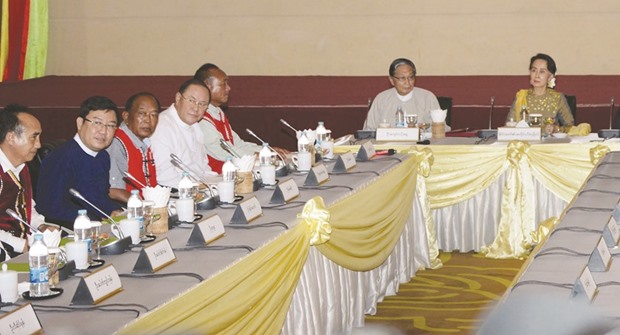Myanmar’s most heavily-armed ethnic group held “positive” talks yesterday with the country’s de facto leader Aung San Suu Kyi, a spokesman for her office said, in a major boost for peace prospects.
The United Wa State Army (UWSA) stopped fighting the government in 1989 in exchange for control of a remote portion of territory bordering China which is believed to be awash with drugs.
However, they have a 20-25,000-strong standing army and are yet to commit to a full nationwide ceasefire, undercutting Suu Kyi’s aim of swiftly securing a lasting peace.
Several complex ethnic conflicts are rumbling across Myanmar’s borderlands, hampering efforts to build the country’s economy after the end of junta rule.
Some groups who fought the army for decades have signed ceasefires but those are fragile, adding urgency to Suu Kyi’s task.
The Wa are accused of producing and trafficking huge amounts of methamphetamine and heroin from their secretive holdout and buying weapons with the proceeds.
Yesterday’s “very positive discussions” between leaders of the Wa, a powerful group called the National Democratic Alliance Army-Eastern Shan State (NDAA-ESSm, also known as the Mongla Army), and Suu Kyi were an “important first step” in building trust, Zaw Htay, spokesman for her office, told reporters.
Suu Kyi wants to convene a meeting to thrash out the precepts of greater federal autonomy for ethnic groups in exchange for peace.
It is dubbed the 21st Panglong conference in a nod to a historic conference called by her independence hero father – Aung San – in 1947 that saw major ethnic groups commit to joining Myanmar.
However, that deal fell apart under the junta that took control several years after Aung San’s assassination and embarked on almost 50 years of devastating rule.
Suu Kyi has not set a date for the meeting but is ramping up efforts to ensure all rebel groups are at the table.
Both the USWA and Mongla army “support the 21st century Panglong conference and they will try to participate”, Zaw Htay added.
Experts say that Myanmar’s myriad conflicts are entwined with the illicit trade in drugs, jade and timber, which makes ending them all the more complicated.
Tens of thousands of people have been killed or displaced by the decades of war.

Suu Kyi in the meeting with leaders of the UWSA and the National Democratic Alliance Army-Eastern Shan State (NDAA-ESS, also known as the Mongla Army) in Naypyidaw yesterday while other ethnic rebel armies held a summit in the border town of Mai Ja Yang. Myanmar has been racked for half a century by ethnic rebel wars in its resource-rich frontier states, leaving tens of thousands dead or displaced.
